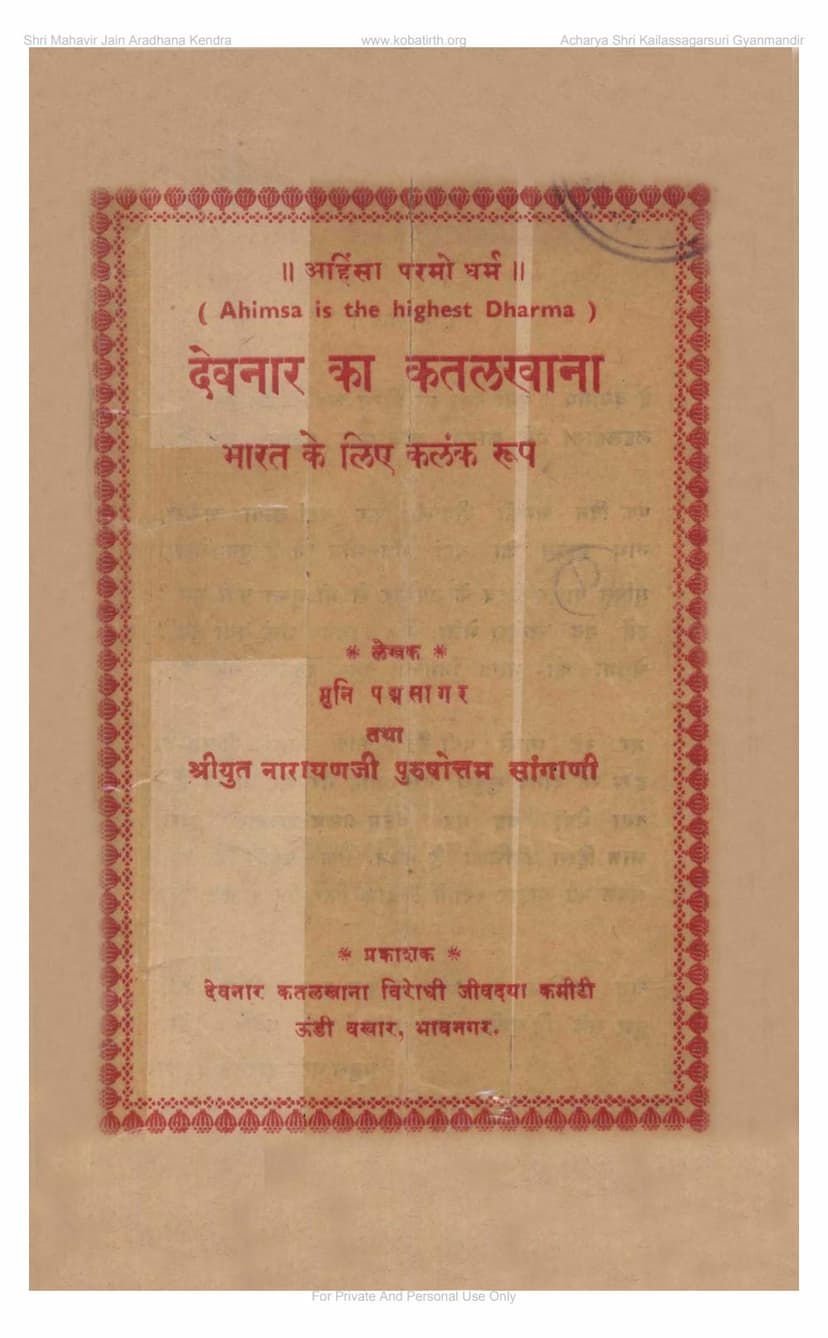Devnar Ka Katalkhana Bharat Ke Lie Kalank Roop
Added to library: September 1, 2025

Summary
Here's a comprehensive summary of the Jain text "Devnar Ka Katalkhana Bharat Ke Lie Kalank Roop" (The Devnar Slaughterhouse is a Disgrace to India), based on the provided pages:
Book Title: Devnar Ka Katalkhana Bharat Ke Lie Kalank Roop (The Devnar Slaughterhouse is a Disgrace to India) Author(s): Muni Padmasagar, Narayan Sangani Publisher: Devnagar Katalkhana Virodhi Jivdaya Committee (Devnagar Slaughterhouse Opposition Committee for Compassion towards Living Beings) Core Theme: The book strongly condemns the establishment of a modern, mechanized slaughterhouse in Devnar, Mumbai, arguing that it is a national disgrace and a betrayal of India's ancient heritage of non-violence (Ahimsa).
Key Arguments and Content:
-
Critique of the Devnar Slaughterhouse: The central argument is that the proposed slaughterhouse, equipped with modern machinery, will lead to the mass killing of thousands of innocent animals daily. This is presented as a barbaric and shameful act, particularly for a nation like India, which has historically been a beacon of non-violence and compassion.
-
Betrayal of Indian Culture and Heritage: The authors emphasize that India's ancient civilization is deeply rooted in the principle of "Ahimsa Paramo Dharma" (Non-violence is the highest Dharma). They lament that the government, by promoting such a large-scale slaughterhouse, is disregarding this foundational principle and betraying the sacrifices of freedom fighters who envisioned an India based on righteousness and compassion.
-
Rejection of Meat Consumption: The book extensively argues against meat consumption from various perspectives:
- Religious: It asserts that all major religions, including Jainism, Hinduism, Buddhism, Christianity, and Islam, fundamentally advocate for compassion and condemn the infliction of pain and suffering on living beings. Jainism's philosophy of Ahimsa is highlighted as particularly comprehensive, extending to even the smallest organisms.
- Ethical: The authors question human superiority if it is based on the exploitation and slaughter of defenseless animals. True greatness lies in kindness, love, and empathy towards all living creatures.
- Physical/Health: Numerous arguments and expert opinions (from doctors and researchers) are presented to demonstrate that meat consumption is unnatural, unhealthy, and can lead to various diseases, including cancer, heart problems, and mental degradation. They argue that vegetarianism provides sufficient nutrition and promotes better health and longevity. They also contrast the digestive systems of humans and carnivorous animals to support their vegetarian stance.
- Environmental/Economic: The text points out the detrimental impact of meat consumption on agriculture and the environment, arguing that the killing of cattle reduces milk production and manure, essential for fertile farming in a country like India, which relies heavily on traditional agriculture.
-
Historical Context: The book cites historical accounts from travelers like Fa Xian and Hiuen Tsang, as well as the writings of emperors like Harshavardhana, to illustrate that meat consumption was not prevalent in ancient India. They attribute the rise of meat-eating and animal sacrifice to invasions and the influence of foreign cultures, particularly during the Mughal and British eras.
-
Government's Role and Call to Action: The authors strongly criticize the government for encouraging violence and meat consumption under the guise of industrial development and economic progress. They argue that the government is ignoring public sentiment and democratic principles. The book urges the Indian public to actively oppose such "violent schemes" through organized protest and to awaken their conscience.
-
Critique of Justifications for Meat Consumption: The book systematically refutes common justifications for meat consumption, such as food shortages, agricultural damage by animals, and the need for scientific advancements or medicines derived from animal products. They argue these are mere excuses and that natural, non-violent methods are preferable and more sustainable.
-
International Perspective: The text references quotes from international figures like George Bernard Shaw and discusses how vegetarianism is gaining traction in Europe, highlighting the perceived hypocrisy of India abandoning its own tradition.
-
The Power of Unity and Dharma: The authors repeatedly emphasize the strength of collective action and adherence to Dharma. They inspire readers to overcome mental weakness and fear, to unite, and to fight for their rights and for the protection of all living beings, even if it means facing opposition.
-
Call for Moral and Spiritual Purity: The book concludes with a fervent plea for self-reflection, urging individuals to adopt a vegetarian diet, renounce harmful substances, and cultivate universal love and compassion. It emphasizes that true strength comes from spiritual discipline and adherence to righteous principles, as advocated by all religions.
Overall Tone: The book is impassioned, critical, and appeals strongly to the reader's sense of morality, religious duty, and national pride. It serves as a powerful manifesto against animal slaughter and meat consumption, urging a return to India's core values of Ahimsa and compassion.